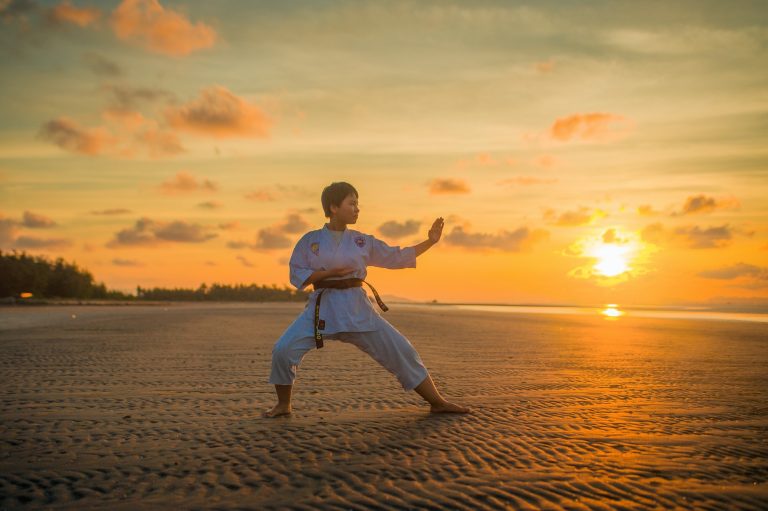Karate-Selbstverteidigungsfähigkeiten
Karate ist eine der effektivsten Kampfkünste, die sowohl zur Verbesserung der körperlichen Fitness als auch zur Selbstverteidigung genutzt werden kann. In diesem Blogbeitrag werden wir uns auf die Selbstverteidigungsfähigkeiten konzentrieren, die durch die Praxis von Karate erworben werden können.
1. Selbstbewusstsein
Eine der wichtigsten Fähigkeiten, die durch das Karate erworben werden können, ist ein gestärktes Selbstbewusstsein. Die regelmäßige Praxis von Karate gibt einem das Selbstvertrauen, um schwierige Situationen selbstbewusst anzugehen. Dies ist entscheidend in der Selbstverteidigung, da Täter oft nach Opfern Ausschau halten, die unsicher wirken.
2. Körperkontrolle
Karate erfordert ein hohes Maß an Kontrolle über den eigenen Körper. Durch das Laufen von Katas, das sind feste Abläufe von Angriffs- und Abwehrtechniken, wird die Körperbeherrschung verbessert und dadurch wird man in einer Kampfsituation ruhiger und effizienter agieren können.
3. Schnelligkeit und Genauigkeit
Im Karate sind Schnelligkeit und Genauigkeit entscheidend. Die Fähigkeit, schnell und präzise Angriffe und Abwehrbewegungen auszuführen, kann in einer Selbstverteidigungssituation den entscheidenden Unterschied ausmachen.
4. Selbstverteidigungs-Techniken
Die Selbstverteidigungstechniken im Karate können sehr effektiv sein. Dazu gehören Schläge, Tritte, Griffe und Würfe, die einem helfen, sich aus einer gefährlichen Situation zu befreien. Die Praxis in einem Karate-Dojo gibt auch die Möglichkeit, diese Techniken unter realen Bedingungen zu trainieren, was die Effektivität in einer realen Situation erhöht.
5. Mentalität
Ein wichtiger Aspekt der Selbstverteidigung ist die mental Vorbereitung auf einen Angriff. Im Karate lernen Sie, Ihren Geist zu kontrollieren und in stressigen Situationen ruhig und konzentriert zu bleiben. Eine positive und entschlossene Einstellung kann Ihnen helfen, einen Angriff zu überstehen und sich zu verteidigen.
Zusammenfassung
Karate ist eine Kampfkunst, die eine Vielzahl von Fähigkeiten und Techniken bietet, die für die Selbstverteidigung von entscheidender Bedeutung sein können. Durch die Praxis von Karate können Sie Selbstvertrauen aufbauen, Körperbeherrschung erlangen und Techniken erlernen, die Ihnen in einer gefährlichen Situation helfen können. Insgesamt ist Karate eine großartige Option für alle, die ihre Selbstverteidigungsfähigkeiten verbessern möchten.
Frequently Asked Questions on Karate Self Defense Skills
Karate is a martial art that originated from Okinawa, Japan. It is a popular form of self-defense that helps individuals build confidence, strength, and discipline. Self-defense is an essential skill that everyone must learn to protect themselves from potential harm. If you’re considering taking up karate for self-defense or have questions about it, this blog post is for you. Here are some frequently asked questions about karate self-defense skills:
1. What is karate self-defense?
Karate self-defense is a set of techniques used to protect oneself in a dangerous situation. Karate self-defense techniques involve using punches, kicks, throws, and joint locks to subdue the attacker. The techniques taught in karate self-defense classes are designed to be practical and effective in real-life situations.
2. Is karate self-defense effective?
Yes, karate self-defense is an effective way to protect yourself in dangerous situations. Learning karate self-defense techniques can give you the confidence and skills you need to defend yourself against an attacker. You can also enhance your reflexes and physical fitness through karate training, making you better equipped to handle stressful situations.
3. Who can learn karate self-defense?
Karate self-defense is suitable for people of all ages and genders. Anyone can learn karate self-defense skills, and it’s never too late to start. In fact, learning self-defense techniques can benefit individuals who might be at a higher risk of being attacked, such as women or elderly individuals.
4. What should I look for in a karate self-defense class?
When looking for a karate self-defense class, it’s important to consider the instructor’s credentials and experience. Look for a class that emphasizes safe and realistic training methods. The class should also provide appropriate protective gear such as gloves, mouth guards, and headgear. Finally, make sure that the class aligns with your training goals and schedule.
5. Do I need to be physically fit to learn karate self-defense?
No, you don’t need to be physically fit to learn karate self-defense. Karate training is designed to improve your physical fitness over time. If you have any physical limitations or injuries, you should discuss them with your instructor before starting training. Your instructor can recommend modifications to the techniques to ensure your safety and comfort.
6. Can karate self-defense be used for real-life situations?
Yes, karate self-defense techniques are designed to be practical and effective in real-life situations. However, it’s important to note that self-defense situations can be unpredictable and dangerous. In such situations, the best course of action may be to remove yourself from the situation rather than using physical force.
7. How long does it take to become proficient in karate self-defense?
The time it takes to become proficient in karate self-defense varies depending on your level of dedication, frequency of training, and natural abilities. However, with consistent training, individuals can become proficient in karate self-defense techniques in a few months to a few years.
8. Can karate self-defense training help me develop discipline?
Yes, karate training can help you develop discipline and self-control. The physical and mental discipline required for karate training can help you develop a strong work ethic, which can carry over to other areas of your life.
9. Is the purpose of karate self-defense to harm the attacker?
No, the purpose of karate self-defense is not to harm the attacker, but rather to neutralize the threat and protect oneself. Karate self-defense techniques teach individuals how to subdue an attacker without causing excessive harm.
10. Can I practice karate self-defense at home?
It’s recommended that you practice karate self-defense techniques under the supervision of a qualified instructor. However, you can practice basic techniques at home to maintain your skills and improve your muscle memory. Always ensure that you have enough space to practice safely and avoid practicing techniques on hard or uneven surfaces.
Conclusion
Karate self-defense is an effective way to protect yourself in dangerous situations. Anyone can learn karate self-defense skills, and it’s never too late to start. When looking for a karate self-defense class, consider the instructor’s credentials, training methods, and your training goals. Remember that the purpose of karate self-defense is not to harm the attacker but to neutralize the threat and protect oneself. With consistent training, individuals can become proficient in karate self-defense techniques in a few months to a few years.
Inhaltsverzeichnis






